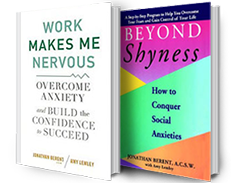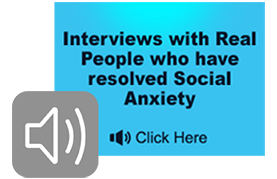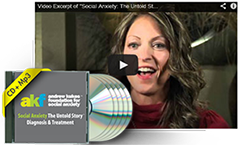You avoid social/ interactive situations because of uncomfortable feelings.
You panic (physically or emotionally) in social/interactive situations.
You worry excessively about what others will think of you.
You often say “I don’t have anything to say” or “I don’t know what to say”.
You are concerned about being noticeably nervous.
You have difficulty establishing relationships.
You experience feelings of loneliness and sadness.
You spend excessive time on the computer at the expense of socialization.
You overly depend on technology instead of directly interacting.
You have an over-dependence on family for socialization.
You fear intimacy (emotional or physical).
You avoid communication.
You’re over-dependent on substances (prescription or other).
You need alcohol to socialize effectively.
You suffer from learning disabilities.
You worry excessively about blushing or sweating.
You over-emphasize mistakes.
You have obsessive characteristics.
You are a perfectionist.
Your personality, generally speaking, is avoidant.
Your personality, generally speaking, is dependent.
If you checked four or more, it’s likely that social anxiety is present. If you checked more than five, you or your dependent have a substantial issue with social anxiety. The more symptoms you checked the more severe the problem.
Social Anxiety Disorder
A social anxiety disorder can be generalized or specific, taking the form of various social phobias including fear of public speaking, performance anxiety, selective mutism, fear of intimacy or intense shyness. The disorder is a disease of inhibition and avoidance. People with social anxiety disorder suffer from distorted thinking and fear regarding their image and their effect on and opinions of others in a social situation.
Social Anxiety Disorder Symptoms
Sufferers of social anxiety disorder sense that “something is wrong,” but may have difficulty pinpointing exactly what’s bothering them. In social situations, social anxiety disorder may be manifested by:
- feelings of extreme vulnerability
- fear of being noticeably nervous
- intense fear (anxiety)
- feelings of low self-confidence
- intense nervousness
- extreme self-consciousness
- physical responses including heart palpitations, blushing, sweating, stomach pains, diarrhea
These symptoms of social anxiety disorder are not a rational response to the given situation and tend to intensify as the person remains in the situation. They trigger intense, debilitating feelings of helplessness and hopelessness and a self-created sense of being handicapped.
The Vicious Cycle of a Social Anxiety Disorder
Social anxiety disorder is isolating and self-feeding: in a social setting, the person with the disorder typically feels worse and worse and wants to disappear into the woodwork at the risk of “standing out.” The desire to flee is overwhelming, and generally the person will do anything possible to avoid being in the situation again. The memory of the anxiety felt during the situation inhibits the person from being put in the same situation again. In an extreme case of social anxiety disorder the person develops an avoidance disorder and shuns nearly all mentally uncomfortable social/public interactions.
There are many attractive, high-achieving, intelligent people who exhibit symptoms of social anxiety disorders in specific situations, unbeknownst to an outside observer. Or the specific scenario may elicit a visible physiological response, like the person blushing heavily when required to speak out in public. The cycle gets rolling when the person starts to panic in regard to a specific scenario, worrying obsessively that s/he will have the physiological response in front of people.
Social anxiety disorder can also be pervasive, affecting adults, teenagers and children across the board, not situation-specific. These people are pathologically over-dependent on their parents or care-givers, and develop an intertwined unhealthy relationship that feeds their social anxiety disorder.
Social Anxiety Disorder Treatment
Social anxiety disorders are self-isolating, preventing the person from seeking help. Unfortunately, those who do seek help are often misdiagnosed and receive inappropriate treatment. Many social anxiety sufferers get depressed, but the depression is in response to their social anxiety disorder, and it is the disorder that must be the focus of treatment before the depression will be alleviated.
Successful treatment entails empowering the patient to respond rationally to social situations. With patient motivation and proper therapeutic guidance, social anxiety disorders can be overcome.
Social anxiety disorder encompasses a spectrum of problems including the selective mutism -public speaking anxiety paradigm. Social anxiety itself occurs in many degrees, and has numerous manifestations including performance anxiety, fear of public speaking, selective mutism in children, adolescents, and adults, intimacy anxiety, and school phobia. In addition, social anxiety disorder can be a gateway to avoidant and dependent personality.
Social anxiety is based on performance dynamics. This is what separates it from other anxiety disorders. Anxiety is fear. When anxiety creates avoidance of the performance scenario a social phobia is present.
While there are many examples of social anxiety, a disorder which impacts individuals of all ages and cultures, there are two basic types of individuals who have the problem; individuals with and without “initiative”. “Initiative” does not mean ability. It means “the motivation to start up”, or “to get help or resolve the problem”.
In my clinical experience, which spans over 35 years and includes clinical work with social anxiety sufferers of all ages, I have seen everything from a total resolution to the problem, to the problem being permanent, and everything in between.
A crucial fact for those afflicted with social anxiety disorder, and for their loved ones, is the reality that the earlier there is productive help the more potential there is to resolve the anxiety before it becomes integrated into the personality and lifestyle. The perfect example of this is selective mutism in children, which is a profound example of social anxiety and social phobia at an early age. In addition it is a variation of obsessive compulsive disorder.



